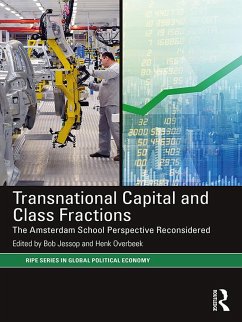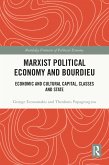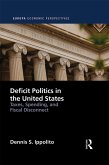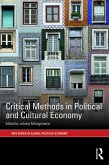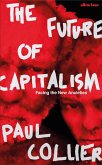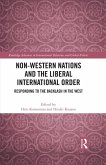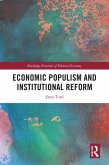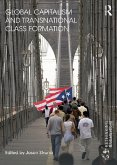Transnational Capital and Class Fractions (eBook, ePUB)
The Amsterdam School Perspective Reconsidered
Redaktion: Jessop, Bob; Overbeek, Henk
40,95 €
40,95 €
inkl. MwSt.
Sofort per Download lieferbar

20 °P sammeln
40,95 €
Als Download kaufen

40,95 €
inkl. MwSt.
Sofort per Download lieferbar

20 °P sammeln
Jetzt verschenken
Alle Infos zum eBook verschenken
40,95 €
inkl. MwSt.
Sofort per Download lieferbar
Alle Infos zum eBook verschenken

20 °P sammeln
Transnational Capital and Class Fractions (eBook, ePUB)
The Amsterdam School Perspective Reconsidered
Redaktion: Jessop, Bob; Overbeek, Henk
- Format: ePub
- Merkliste
- Auf die Merkliste
- Bewerten Bewerten
- Teilen
- Produkt teilen
- Produkterinnerung
- Produkterinnerung

Bitte loggen Sie sich zunächst in Ihr Kundenkonto ein oder registrieren Sie sich bei
bücher.de, um das eBook-Abo tolino select nutzen zu können.
Hier können Sie sich einloggen
Hier können Sie sich einloggen
Sie sind bereits eingeloggt. Klicken Sie auf 2. tolino select Abo, um fortzufahren.

Bitte loggen Sie sich zunächst in Ihr Kundenkonto ein oder registrieren Sie sich bei bücher.de, um das eBook-Abo tolino select nutzen zu können.
Presenting a concise and instructive introduction to the origins, development and significance of the Amsterdam School's distinct approach, this book provides a unique overview of the School's contemporary significance for the field of International Political Economy.
- Geräte: eReader
- ohne Kopierschutz
- eBook Hilfe
- Größe: 1.39MB
Andere Kunden interessierten sich auch für
![Marxist Political Economy and Bourdieu (eBook, ePUB) Marxist Political Economy and Bourdieu (eBook, ePUB)]() George EconomakisMarxist Political Economy and Bourdieu (eBook, ePUB)42,95 €
George EconomakisMarxist Political Economy and Bourdieu (eBook, ePUB)42,95 €![Deficit Politics in the United States (eBook, ePUB) Deficit Politics in the United States (eBook, ePUB)]() Dennis IppolitoDeficit Politics in the United States (eBook, ePUB)45,95 €
Dennis IppolitoDeficit Politics in the United States (eBook, ePUB)45,95 €![Critical Methods in Political and Cultural Economy (eBook, ePUB) Critical Methods in Political and Cultural Economy (eBook, ePUB)]() Critical Methods in Political and Cultural Economy (eBook, ePUB)43,95 €
Critical Methods in Political and Cultural Economy (eBook, ePUB)43,95 €![The Future of Capitalism (eBook, ePUB) The Future of Capitalism (eBook, ePUB)]() Paul CollierThe Future of Capitalism (eBook, ePUB)14,99 €
Paul CollierThe Future of Capitalism (eBook, ePUB)14,99 €![Non-Western Nations and the Liberal International Order (eBook, ePUB) Non-Western Nations and the Liberal International Order (eBook, ePUB)]() Non-Western Nations and the Liberal International Order (eBook, ePUB)42,95 €
Non-Western Nations and the Liberal International Order (eBook, ePUB)42,95 €![Economic Populism and Institutional Reform (eBook, ePUB) Economic Populism and Institutional Reform (eBook, ePUB)]() Emre ÜnalEconomic Populism and Institutional Reform (eBook, ePUB)42,95 €
Emre ÜnalEconomic Populism and Institutional Reform (eBook, ePUB)42,95 €![Global Capitalism and Transnational Class Formation (eBook, ePUB) Global Capitalism and Transnational Class Formation (eBook, ePUB)]() Global Capitalism and Transnational Class Formation (eBook, ePUB)29,95 €
Global Capitalism and Transnational Class Formation (eBook, ePUB)29,95 €-
-
-
Presenting a concise and instructive introduction to the origins, development and significance of the Amsterdam School's distinct approach, this book provides a unique overview of the School's contemporary significance for the field of International Political Economy.
Dieser Download kann aus rechtlichen Gründen nur mit Rechnungsadresse in A, B, BG, CY, CZ, D, DK, EW, E, FIN, F, GR, HR, H, IRL, I, LT, L, LR, M, NL, PL, P, R, S, SLO, SK ausgeliefert werden.
Produktdetails
- Produktdetails
- Verlag: Taylor & Francis eBooks
- Seitenzahl: 324
- Erscheinungstermin: 14. August 2018
- Englisch
- ISBN-13: 9781351251921
- Artikelnr.: 58401403
- Verlag: Taylor & Francis eBooks
- Seitenzahl: 324
- Erscheinungstermin: 14. August 2018
- Englisch
- ISBN-13: 9781351251921
- Artikelnr.: 58401403
- Herstellerkennzeichnung Die Herstellerinformationen sind derzeit nicht verfügbar.
Bob Jessop is Distinguished Professor of Sociology and Co-Director of the Cultural Political Economy Research Centre at Lancaster University. Henk Overbeek is Emeritus Professor of International Relations. He has taught international relations and international political economy at the Vrije Universiteit Amsterdam since 1999.
Introduction - Political economy, capital fractions, transnational class
formation: The intellectual pedigree of the Amsterdam School Part I The
Amsterdam School: Key contributions 1 The Dutch bourgeoisie between the two
world wars (1979) 2 Class formation at the international level (1979) 3
Finance capital and the crisis in Britain (1980) 4 The international
corporate elite (1982) 5 Transnational class agency and European
governance: The case of the European Round Table of Industrialists (2000) 6
Asymmetrical regulation and multidimensional governance in the European
Union (2004) Part II Critical commentaries 7 Class fractions and hegemonic
concepts of control 8 Losing control? The Amsterdam School travels East 9
The Amsterdam School and its implications for Chinese scholars 10
Reconsidering the 'dangerous liaisons' between China and neoliberalism and
its impact in Latin America and Caribbean countries 11 Saying Goodbye?
Tracing my itinerary from Amsterdam to Beijing 12 Reflections on the
Amsterdam School and the transnational capitalist class 13 Theories of
imperialism: Rivalries and unity 14 Nationalist populism within the Lockean
heartland 15 Out of Amsterdam! Beyond the boundaries of (transnational)
capitalist class formation 16 The Amsterdam School: Gender as a blind spot?
17 The Amsterdam School, critical realism and the study of 'deep
structures' 18 Confronting global governance after the historical turn in
IR 19 Network analysis and the Amsterdam School: An unfulfilled promise?
PART III The Amsterdam School and the Political Economy of Contemporary
Capitalism 20 A transnational analysis of the current crisis 21 Putting the
Amsterdam School in its place
formation: The intellectual pedigree of the Amsterdam School Part I The
Amsterdam School: Key contributions 1 The Dutch bourgeoisie between the two
world wars (1979) 2 Class formation at the international level (1979) 3
Finance capital and the crisis in Britain (1980) 4 The international
corporate elite (1982) 5 Transnational class agency and European
governance: The case of the European Round Table of Industrialists (2000) 6
Asymmetrical regulation and multidimensional governance in the European
Union (2004) Part II Critical commentaries 7 Class fractions and hegemonic
concepts of control 8 Losing control? The Amsterdam School travels East 9
The Amsterdam School and its implications for Chinese scholars 10
Reconsidering the 'dangerous liaisons' between China and neoliberalism and
its impact in Latin America and Caribbean countries 11 Saying Goodbye?
Tracing my itinerary from Amsterdam to Beijing 12 Reflections on the
Amsterdam School and the transnational capitalist class 13 Theories of
imperialism: Rivalries and unity 14 Nationalist populism within the Lockean
heartland 15 Out of Amsterdam! Beyond the boundaries of (transnational)
capitalist class formation 16 The Amsterdam School: Gender as a blind spot?
17 The Amsterdam School, critical realism and the study of 'deep
structures' 18 Confronting global governance after the historical turn in
IR 19 Network analysis and the Amsterdam School: An unfulfilled promise?
PART III The Amsterdam School and the Political Economy of Contemporary
Capitalism 20 A transnational analysis of the current crisis 21 Putting the
Amsterdam School in its place
Introduction - Political economy, capital fractions, transnational class
formation: The intellectual pedigree of the Amsterdam School Part I The
Amsterdam School: Key contributions 1 The Dutch bourgeoisie between the two
world wars (1979) 2 Class formation at the international level (1979) 3
Finance capital and the crisis in Britain (1980) 4 The international
corporate elite (1982) 5 Transnational class agency and European
governance: The case of the European Round Table of Industrialists (2000) 6
Asymmetrical regulation and multidimensional governance in the European
Union (2004) Part II Critical commentaries 7 Class fractions and hegemonic
concepts of control 8 Losing control? The Amsterdam School travels East 9
The Amsterdam School and its implications for Chinese scholars 10
Reconsidering the 'dangerous liaisons' between China and neoliberalism and
its impact in Latin America and Caribbean countries 11 Saying Goodbye?
Tracing my itinerary from Amsterdam to Beijing 12 Reflections on the
Amsterdam School and the transnational capitalist class 13 Theories of
imperialism: Rivalries and unity 14 Nationalist populism within the Lockean
heartland 15 Out of Amsterdam! Beyond the boundaries of (transnational)
capitalist class formation 16 The Amsterdam School: Gender as a blind spot?
17 The Amsterdam School, critical realism and the study of 'deep
structures' 18 Confronting global governance after the historical turn in
IR 19 Network analysis and the Amsterdam School: An unfulfilled promise?
PART III The Amsterdam School and the Political Economy of Contemporary
Capitalism 20 A transnational analysis of the current crisis 21 Putting the
Amsterdam School in its place
formation: The intellectual pedigree of the Amsterdam School Part I The
Amsterdam School: Key contributions 1 The Dutch bourgeoisie between the two
world wars (1979) 2 Class formation at the international level (1979) 3
Finance capital and the crisis in Britain (1980) 4 The international
corporate elite (1982) 5 Transnational class agency and European
governance: The case of the European Round Table of Industrialists (2000) 6
Asymmetrical regulation and multidimensional governance in the European
Union (2004) Part II Critical commentaries 7 Class fractions and hegemonic
concepts of control 8 Losing control? The Amsterdam School travels East 9
The Amsterdam School and its implications for Chinese scholars 10
Reconsidering the 'dangerous liaisons' between China and neoliberalism and
its impact in Latin America and Caribbean countries 11 Saying Goodbye?
Tracing my itinerary from Amsterdam to Beijing 12 Reflections on the
Amsterdam School and the transnational capitalist class 13 Theories of
imperialism: Rivalries and unity 14 Nationalist populism within the Lockean
heartland 15 Out of Amsterdam! Beyond the boundaries of (transnational)
capitalist class formation 16 The Amsterdam School: Gender as a blind spot?
17 The Amsterdam School, critical realism and the study of 'deep
structures' 18 Confronting global governance after the historical turn in
IR 19 Network analysis and the Amsterdam School: An unfulfilled promise?
PART III The Amsterdam School and the Political Economy of Contemporary
Capitalism 20 A transnational analysis of the current crisis 21 Putting the
Amsterdam School in its place
